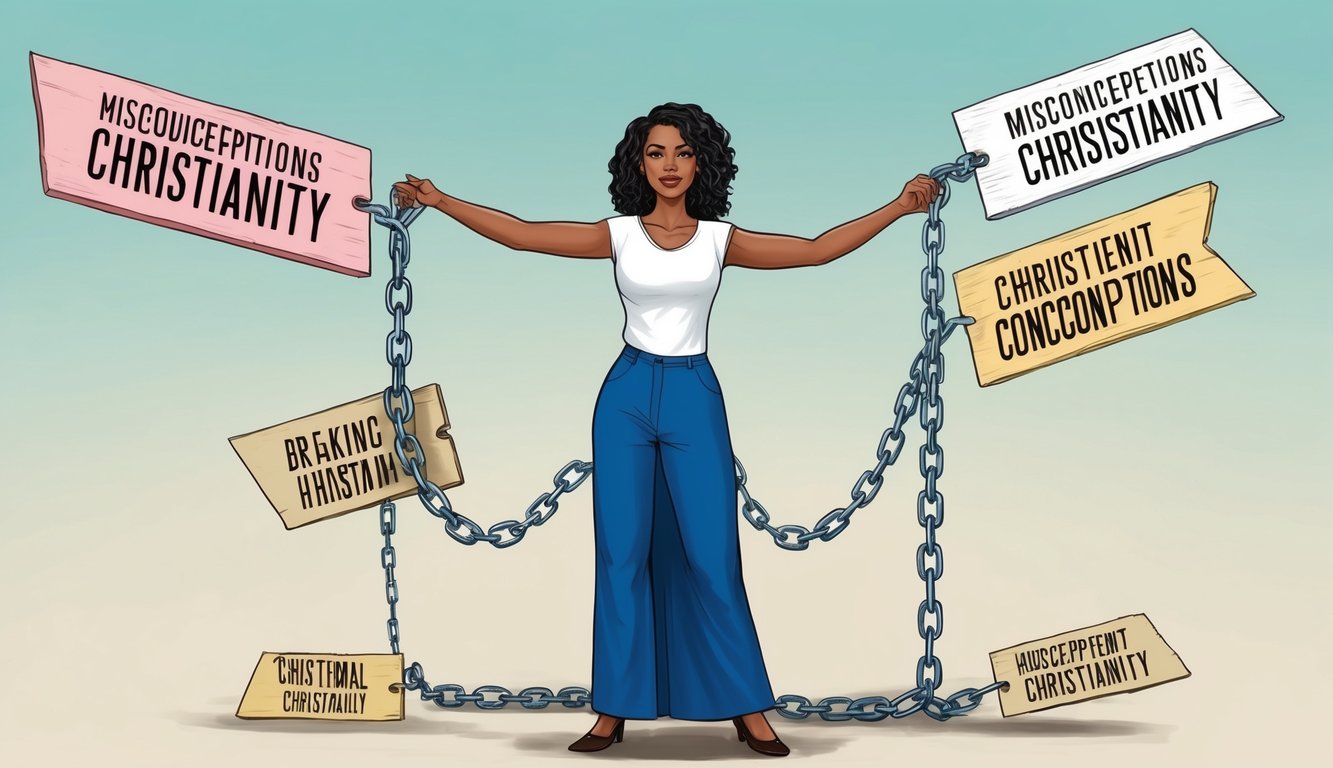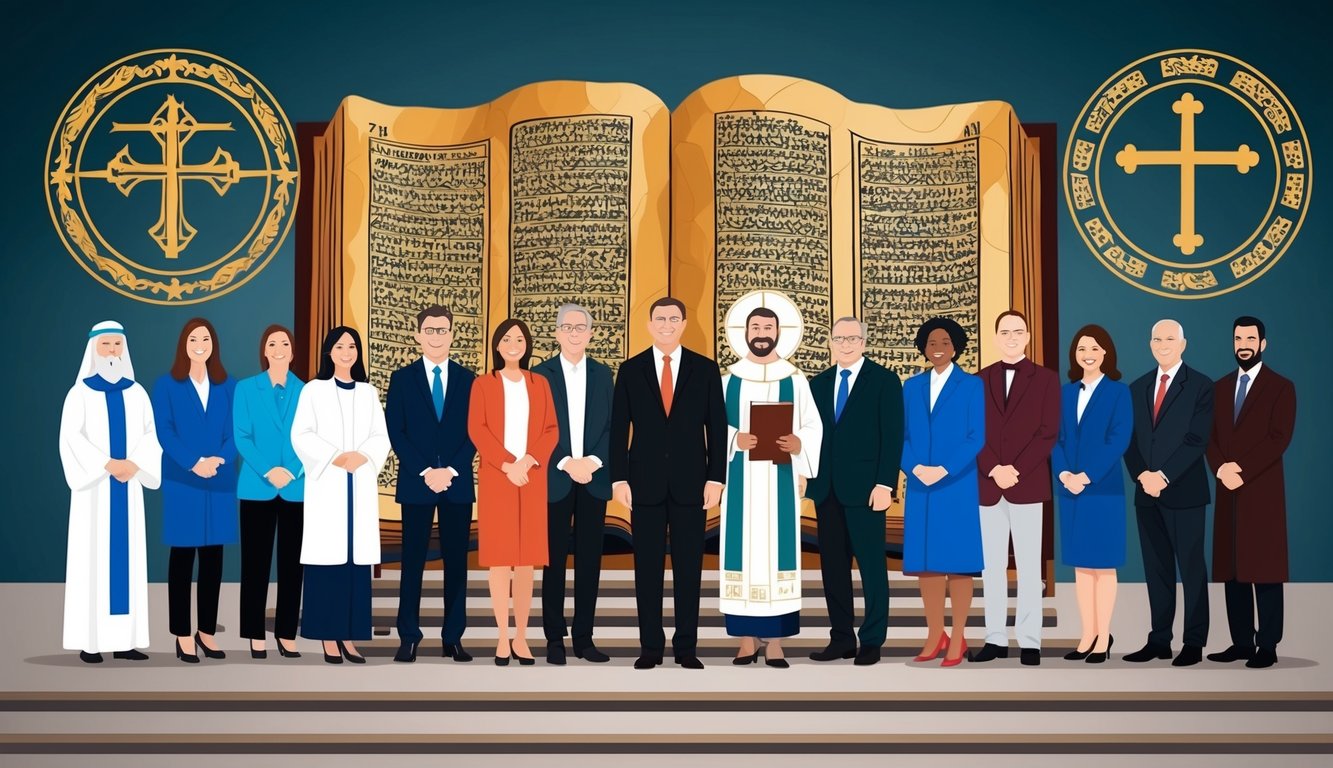Don’t Miss Out On This Unique Astrological Opportunity
Are you tired of spinning your wheels and getting nowhere? Simply put, you’re out of sync: you’re out of alignment with your astral configuration.
But: there’s a kind of map that can help you reclaim your alignment. Think of it as your own personal blueprint to success and happiness: a blueprint that will help you live your most amazing life.
Get started here.
Many people hold misconceptions about Christianity that can lead to confusion and misunderstanding.
These ideas often arise from cultural narratives, media portrayals, or simply a lack of knowledge about the faith.
By clarifying these misconceptions, you can gain a more accurate view of what Christianity truly teaches and represents.

As you explore these misconceptions, you’ll uncover insights that challenge popular beliefs.
Understanding the true message of Christianity can deepen your faith and help you engage more thoughtfully with others.
This journey will not only inform you but also invite you to see the richness of the Christian experience in a new light.
1) Salvation can be earned by good deeds
Many people think that good deeds can earn them salvation.
This idea is common but not what Christianity teaches.
In fact, salvation is a gift from God.
You cannot pay for it or earn it through actions.
The Bible makes this clear; it tells us that salvation comes through faith in Jesus Christ.
Good works are important, but they do not guarantee salvation.
They are a response to the love you receive from God, not a way to earn His favor.
When you accept Jesus, your good deeds reflect your faith.
Believing that you can earn your way into heaven can lead to anxiety.
Instead, focusing on your faith and relationship with God brings peace.
Remember that salvation is about trust, not a checklist of behaviors.
Embrace the gift of grace.
Trust in Jesus, and let your actions flow from that trust.
This is the heart of Christianity.
2) The Bible has been altered over time
Many people believe that the Bible has been changed throughout history.
This idea comes from misunderstandings about how the Bible was preserved.
The truth is that the Bible has a large number of ancient manuscripts.
These documents help scholars compare and confirm what the original texts said.
This makes it easier to spot any changes or errors that may have occurred over time.
While there are some minor differences in wording, the core messages and teachings remain solid.
For instance, the Lord’s Prayer appears in slightly different forms in Matthew and Luke, but the main ideas stay intact.
Scholars agree that the Bible is remarkably well-preserved.
Rather than supporting the idea that the Bible has been altered, the evidence shows that its message has stayed consistent.
You can read the same teachings that were shared many centuries ago.
3) Faith and science are incompatible
Many people think faith and science can’t work together.
This is not true.
Faith, especially in Christianity, focuses on trust and belief.
Science helps us understand how the world works.
Throughout history, there have been moments of conflict.
Some believe that science and faith don’t mix.
Yet, many thinkers argue that they can support each other.
Christianity has played a significant role in the development of modern science.
Your faith doesn’t have to be at odds with scientific discovery.
In fact, many scientists are people of faith.
They see their work as a way to understand God’s creation better.
You can trust both faith and science.
Each has its place in helping you explore life and the world around you.
This relationship can deepen your understanding of your beliefs while satisfying your curiosity about the universe.
4) All Christians take the Bible literally
It’s a common belief that all Christians read the Bible in a literal way.
Yet, this is not true for everyone.
Many Christians understand the Bible as containing different types of writing, such as poetry, history, and parables.
Taking everything literally can lead to misunderstandings.
For instance, when Jesus tells stories or uses metaphors, these are not meant to be taken as strict facts.
Instead, they often carry deeper meanings that reflect moral or spiritual truths.
Certain parts of the Bible are historical, while others use symbols or serve as teachings.
Christians value the messages within the text more than just the words themselves.
Some groups within Christianity may emphasize a literal approach.
However, many interpret the Bible contextually, recognizing its various literary styles and purposes.
This understanding helps you grasp the rich meaning and intent of the scriptures.
It’s important to have open conversations about how different people approach these texts, as it can deepen your appreciation for their messages.
5) Christianity oppresses women

Many people believe that Christianity oppresses women.
This view is common in society today.
Yet, it’s important to look closer at the teachings of Christianity.
In the Bible, men and women are both created in the image of God.
This means both are valuable and important.
Jesus included women in his ministry and had close women followers.
Names like Mary Magdalene show that women played a vital role.
Some claim that the early church favored men.
While it is true that most of Jesus’ disciples were men, he also showed respect for women.
For instance, he spoke with women openly and encouraged them to learn.
Over time, different interpretations of the Bible have shaped how women are viewed in some Christian communities.
Many churches today strive for equality and support women in leadership roles.
So, while some think Christianity oppresses women, many believe it uplifts and empowers them.
It’s key to understand the rich history and varied interpretations within the faith.
6) Christianity demands blind faith

Many people believe that Christianity requires blind faith, but this idea isn’t quite accurate.
Most Christian teachings encourage people to seek evidence and understanding.
In the Bible, figures like Abraham showed a thoughtful kind of faith.
His belief was based on a relationship with God and trust in His promises.
This shows that faith can be paired with reason.
You can find support for your faith in various places.
The prophecies about Jesus, historical events, and eyewitness accounts all provide a strong foundation.
Many Christians believe that faith and reason go hand-in-hand.
They see science and faith as complementary rather than opposing forces.
This means you can ask questions and seek answers while growing in your faith.
Embracing a thoughtful faith allows for a deeper understanding of your beliefs.
It helps you connect with God in a meaningful way, rather than just accepting ideas without questioning them.
7) Christians are perfect people

Many people think that Christians should be perfect or without flaws.
This idea can come from looking at their faith, rather than the reality of human nature.
In truth, Christians are just like anyone else.
They face struggles, make mistakes, and sometimes fall short of their ideals.
Being a Christian means acknowledging these imperfections.
Faith does encourage people to strive for better behavior.
However, it does not mean they will never do wrong.
Instead, it’s about seeking forgiveness and growing from experiences.
You might find that many Christians are honest about their challenges.
They often share their journeys of faith and growth, which can be inspiring and relatable.
Understanding Christian Beliefs

Christianity is built on a foundation of core beliefs that shape the faith and practices of its followers.
There are also common misunderstandings about these beliefs that can create confusion.
Core Tenets of Christianity
At the heart of Christianity are a few key beliefs that define the faith.
Here are some of the most important ones:
-
The Trinity: Christians believe in one God in three persons—Father, Son, and Holy Spirit. This concept can be challenging to understand but signifies unity and diversity within God.
-
Jesus Christ: Christians believe that Jesus is the Son of God who came to Earth, lived a sinless life, died for humanity’s sins, and rose again. His resurrection is central to Christian faith.
-
Salvation: Salvation is often viewed as a gift from God, attainable through faith in Jesus Christ. Believers are taught that good deeds do not earn salvation; instead, faith in Christ does.
-
The Bible: Christians regard the Bible as sacred scripture, containing God’s teachings and guidelines for life. It provides wisdom and direction for living a Christian life.
Common Misunderstandings
Many misconceptions about Christianity can lead to confusion.
Addressing them can help deepen your understanding:
-
Faith vs. Reason: Some think that faith means ignoring reason. In reality, many Christians see their faith as a complement to logical thinking.
-
Worship: A common myth is that Christians worship multiple gods. In fact, they believe in one God who exists in three persons.
-
Christian Values: Some believe all Christians are politically conservative or hold specific views. Christianity is diverse, and believers can have various perspectives on social issues.
-
Misinterpretation of Scripture: Some claim that the Bible is anti-science or endorses outdated practices. Many believers reconcile their faith with scientific understanding.
Historical Context of Christianity

Christianity has a rich historical background that shapes its beliefs and practices.
Understanding its origins and how it has influenced Western culture provides insight into the religion and its impact on society.
Origins and Development
Christianity began in the 1st century CE as a movement within Judaism.
It centers on the life and teachings of Jesus Christ, who believers see as the Messiah.
The early Christians spread their messages throughout the Roman Empire, often facing persecution.
Over time, Christianity separated from Judaism and evolved into a distinct religion.
Key events, such as the Edict of Milan in 313 CE, granted religious freedom and allowed Christianity to flourish.
By the 4th century, it became the state religion of the Roman Empire, which helped solidify its influence on Western civilization.
Influence on Western Culture
Christianity has shaped many aspects of Western culture.
From art and literature to laws and ethics, its teachings have played a significant role.
For instance, many classic works of art, like paintings by Michelangelo and Leonardo da Vinci, were inspired by Christian themes.
The moral teachings of Christianity have also influenced Western legal systems and social values.
Furthermore, major holidays like Christmas and Easter have roots in Christian traditions, highlighting its cultural impact.
The historical context of Christianity not only explains its growth but also its lasting influence on today’s world.
Frequently Asked Questions

Many people have questions about Christianity that come from common misunderstandings.
This section addresses some of these points to help clarify what Christianity truly teaches.
What are some common myths about Christian practices that people often believe?
One myth is that Christianity is just about following a strict set of rules.
Many think that being a Christian means you must always act perfectly.
In reality, it focuses on a relationship with God rather than just rules.
How do people frequently misunderstand the core beliefs of Christianity?
Some people believe that salvation can be earned by good deeds.
This view misses the core belief that faith in Jesus is what brings salvation.
Christianity teaches that it is a gift, not a reward for actions.
In what ways is the identity of Jesus misrepresented?
Many view Jesus only as a great teacher or prophet.
While He is indeed a profound teacher, Christianity teaches that Jesus is also the Son of God, who came to save humanity.
This belief is central to understanding who Jesus really is.
What are the misinterpretations about what it means to be a follower of Jesus?
Some think that all Christians must adhere to the Bible literally.
This interpretation can lead to confusion because many Christians see the Bible as a guide, allowing for different interpretations based on context and culture.
Can you clarify the misconceptions surrounding the history of Christianity?
There is a belief that the Bible has been altered over time to control people.
In truth, while translations exist, scholars work diligently to preserve its messages.
Many ancient texts support the integrity of the Bible’s teachings.
What are the most significant inaccuracies believed about Christianity and other world religions?
A common misconception is that Christianity oppresses women.
In reality, many Christian teachings promote equality and honor women.
Different cultures and traditions may have influenced behaviors, but they do not reflect the heart of Christianity.



